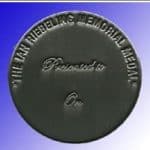News
The Ian Riebeling Memorial Medal

This medal was struck in honour of the late Ian Riebeling, a forensic document examiner with Forensic Science SA in Adelaide. Ian passed away suddenly in February of 2001 and was an active member of the Society. He had held the position of President of the South Australian Branch of the ANZFSS and many other positions in the preceding years.
The medal is awarded every two years, to the best new practitioner (general ANZFSS member) who presents either a paper or poster at the ANZFSS International Symposium. The Ian Riebeling Memorial Medallist is selected from the pool of oral and poster presenters who are within their first five years, or part-time equivalent, of their employment as a forensic practitioner. Presenters need to have declared this at the time of their registration.
In addition to the medal, a monetary prize of $1,500 is awarded by Ian’s family so the winner can advance their professional skills by attending the following ANZFSS Symposium, or an equivalent conference.
Assessment
The assessment criteria are not limited to but will include the following:
- Quality of the presentation
- Content of the presentation
The Symposium Organising Committee will nominate a selection panel to assess presentations by eligible members, which will be chaired by the Scientific Program Chair, and may include Discipline Chairs.
Conditions
The recipient must provide bank account details to the ANZFSS Treasurer for the transference of funds. At this time, the recipient must also provide a plan for the expenditure of the funds, whether that is attendance at the next ANZFSS Symposium, or nominating an alternate conference or professional development activity occurring within the following two years, for the funds to go toward.
Following attendance at the nominated event, the recipient must provide to the ANZFSS Council (via the ANZFSS secretary) a short (1 page) summary of the outcomes of the development activity, highlighting how it benefited the awardee. This may be published in the ANZFSS newsletter and sent to Ian’s family. Copies of receipts for expenditure must be provided to the ANZFSS Treasurer.
The recipient will consent to the use of their imagery by the Society in its publications and/or marketing activities.
Award recipients are responsible for managing all of their own booking and travel requirements, including medical and travel insurance.
Previous winners
2018: Mickayla Dustin (ESR, New Zealand): Further persistence studies of PDMS condom lubricants
2016: Felicity Koens (Australian Federal Police): A background survey of polymers in the act – diversity in isotopic abundance values
2014: Danielle Butzbach (Forensic Science SA): Post-mortem production of paracetamol via degradation of its metabolite
2012: Ashleigh Fox (University of Auckland): Exploring the recovery of mRNA and DNA from chemically treated finger-marks in blood
2010: Lauren Parsons (ESR, New Zealand): Low copy number DNA analysis and document examination: impact of technologies on respective analyses; The New Zealand national DNA database: Simplified DNA profiling using the Whatman FTA elute card and Hamilton Nimbus robotics
2008: Nicole Walker (NZ Police): Distinguishing between expirated blood and impact spatter using chemical and physical methods
2006: Kaye Ballantyne (Victoria Police Forensic Services Department & La Trobe University): Increased profiling success from WGA.d degraded DNA; WGA to assist STR genotyping of trace DNA
2004: Cameron Scadding (Curtin University of Technology): Forensic identification and provenance establishment of oxy-acetylene cutting micro debris from crime scenes
2002: Carolyne Bird (Forensic Science SA): Low temperature infra-red fluorescence for the discrimination of inks
Please contact the SA branch or anzfss_executive@outlook.com for more information.
